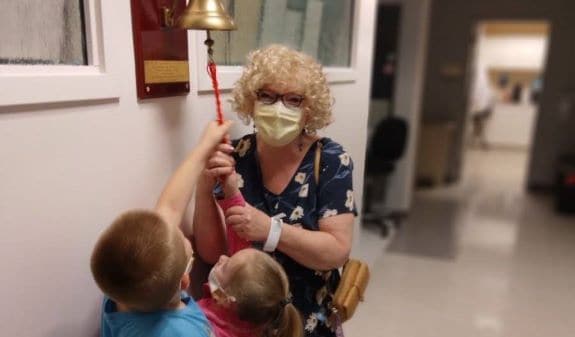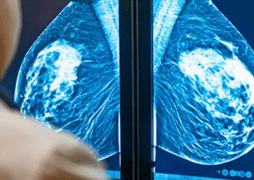There has been much scientific interest in whether vitamin D impacts cancer risk. In November 2010, the Institute of Medicine (IOM) released a report—Dietary Reference Intakes for Calcium and Vitamin D—updating its dietary recommendations for vitamin D. The IOM reviewed the scientific evidence and found while vitamin D was important to bone health, it remains unclear whether it has other health benefits. 1 Although some studies have suggested a protective link between vitamin D and many types of cancer, including breast cancer, vitamin D is not currently recommended for cancer or chronic disease prevention. However, this is an active area of research and a growing number of studies are looking at whether vitamin D might lower the risk of breast cancer.
How could vitamin D lower breast cancer risk?
Although still under study, there are a few ways vitamin D might lower the risk of breast cancer. Cellular and animal studies have shown vitamin D may have some anti-cancer effects including reducing cell growth and promoting cell death.2
How do we get vitamin D?
Our main source of vitamin D is sunlight. When our skin is exposed to it, certain biological processes convert sunlight into vitamin D in our bodies. We also get a smaller amount of vitamin D through our diet. Vitamin D is found naturally in foods like fatty fish (such as salmon and tuna), fish liver oil (such as cod liver oil), liver and egg yolks. Many other foods such as milk, juice, bread and cereals are often fortified with vitamin D. And, you can get vitamin D in a dietary supplement or in a multivitamin.
Does vitamin D reduce the risk of breast cancer?
Findings from prospective cohort studies looking at vitamin D exposure (through sunlight, diet or both) and breast cancer risk are mixed. 3-11 Some show vitamin D slightly lowers risk among premenopausal women (but not among postmenopausal women).4,6 However, many large studies, including a meta-analysis that combined the results of six studies, show no link between vitamin D, from either sunlight exposure or diet, and breast cancer risk.3,5,7,9-11
Why aren’t findings more conclusive?
Studying vitamin D poses many challenges. It is difficult to measure how much vitamin D a person gets because it comes from multiple sources. Researchers must measure how much vitamin D a person gets through diet and how much a person gets through sunlight.
Studying vitamin D in the diet presents a special challenge. Many food items that have vitamin D also contain calcium (milk, for example), which may also lower risk of breast cancer. Thus, if these foods are shown to lower risk, researchers have to determine whether the benefit is related to vitamin D, calcium or both.
Measuring the amount of sunlight a person is exposed to is also difficult. For example, some studies have found lower rates of breast cancer among women who spend more time exercising outdoors compared to rates among those who do not exercise outdoors.3 Because exercise is linked to a lower risk of breast cancer, it is difficult to know whether women in these studies had a lower risk of breast cancer due to the exercise or the sunlight exposure or a combination of the two.
One way to avoid problems with measuring vitamin D through diet and sunlight exposure is to look at blood levels of vitamin D. This allows researchers to compare people with higher levels of vitamin D in their bodies to those with lower levels. It also allows researchers to look at vitamin D apart from calcium.
However, measuring blood levels of vitamin D presents challenges of its own. People who have lower levels of blood vitamin D also tend to have characteristics that increase breast cancer risk. For example, older age, being overweight and not exercising outdoors all lead to lower blood levels of vitamin D while also increasing breast cancer risk. So, findings from studies that do not control for these factors are difficult to interpret. Two large nested case-control studies that did control for several of these factors found no link between blood levels of vitamin D and breast cancer risk.12,13
These research challenges may be partly why the findings from studies on vitamin D and the risk of breast cancer show such mixed findings.
What’s the evidence on vitamin D supplements and breast cancer risk?
The Women’s Health Initiative (WHI), a randomized controlled trial, found no difference in breast cancer risk among women who took a daily vitamin D supplement of 400 international units (IU) and those who took a placebo.14 To date, this is the largest randomized trial to look at vitamin D and breast cancer, but the dose of vitamin D was lower than the amount many believe might be needed for cancer prevention.
A new randomized trial, the VITAL study, is starting to recruit participants to look at the effects of vitamin D and omega-3 fatty acids on heart disease and cancer. This study will use a higher dose of vitamin D than was given in the WHI study. Findings from this study should help us to understand whether there is a relationship between vitamin D and breast cancer.
How much vitamin D should I have?
Getting enough vitamin D is important for your overall health. Some people can get enough vitamin D through sun exposure alone. Being outside in the sunshine, with your arms and legs uncovered, for between five and 30 minutes at least twice a week may be enough for some people.15 If you live in a cold climate, have dark skin tone or wear sunscreen (which is important for preventing skin cancer), the amount of vitamin D you get through sunshine may be less than you need. So, it’s a good idea to get some vitamin D in your diet too. The recommended dietary allowance (RDA) for people ages 1 to 70 (including pregnant and breastfeeding women) is 600 IU. For men and women aged 71 and older, the RDA is 800 IU.1
The IOM report concluded the current data show no additional health benefit to getting more vitamin D than the RDA.1 And, while you can’t get too much vitamin D through sunshine, you can get too much vitamin D in your diet. Too much vitamin D can lead to kidney stones and other health problems.1 Getting more than 4,000 IU per day increases the risk of harmful health effects in both men and women (lower amounts can be harmful for children younger than 9 years).1 Although the IOM report found vitamin D to be important to bone health, it did not recommend taking vitamin D supplements to reduce the risk of breast cancer (or any type of cancer or other chronic disease).1 Talk to your health care provider before starting to take any type of dietary supplement.
Dr. Jennifer Ligibel, medical oncologist at the Dana-Farber Cancer Institute says, “Although there is a lot of interest in vitamin D for breast cancer prevention at the moment, the studies so far don’t show a consistent link between vitamin D and breast cancer. More work is definitely needed in this area. What is clear, however, is that some women are vitamin D deficient, and this could contribute to poor bone health. Women should make sure that they get enough vitamin D in their diets and through (moderate) sun exposure.”
References
1. Committee to Review Dietary Reference Intakes for Vitamin D and Calcium, Food and Nutrition Board, Institute of Medicine. Ross CA, Taylor CL, Yaktine AL, Del Valle HB (eds.). Dietary reference intakes for calcium and vitamin D. The National Academies Press, National Academy of Sciences: Washington, D.C., 2010.
2. National Cancer Institute. Vitamin D and cancer prevention: Strengths and limits of evidence. http://www.cancer.gov/cancertopics/factsheet/prevention/vitamin-D, 2010.
3. John EM, Schwartz GG, Dreon DM, Koo J. Vitamin D and breast cancer risk: the NHANES I Epidemiologic follow-up study, 1971-1975 to 1992. National Health and Nutrition Examination Survey. Cancer Epidemiol Biomarkers Prev. 8(5):399-406, 1999.
4. Shin MH, Holmes MD, Hankinson SE, Wu K, Colditz GA, Willett WC. Intake of dairy products, calcium, and vitamin d and risk of breast cancer. J Natl Cancer Inst. 94(17):1301-11, 2002.
5. McCullough ML, Rodriguez C, Diver WR, et al. Dairy, calcium, and vitamin D intake and postmenopausal breast cancer risk in the Cancer Prevention Study II Nutrition Cohort. Cancer Epidemiol Biomarkers Prev. 14(12):2898-904, 2005.
6. Lin J, Manson JE, Lee IM, Cook NR, Buring JE, Zhang SM. Intakes of calcium and vitamin D and breast cancer risk in women. Arch Intern Med. 167(10):1050-9, 2007.
7. Robien K, Cutler GJ, Lazovich D. Vitamin D intake and breast cancer risk in postmenopausal women: the Iowa Women’s Health Study. Cancer Causes Control. 18(7):775-82, 2007.
8. Millen AE, Pettinger M, Freudenheim JL, et al. Incident invasive breast cancer, geographic location of residence, and reported average time spent outside. Cancer Epidemiol Biomarkers Prev. 18(2):495-507, 2009.
9. Kuper H, Yang L, Sandin S, Lof M, Adami HO, Weiderpass E. Prospective study of solar exposure, dietary vitamin D intake, and risk of breast cancer among middle-aged women. Cancer Epidemiol Biomarkers Prev. 18(9):2558-61, 2009.
10. Edvardsen K, Veierød MB, Brustad M, Braaten T, Engelsen O, Lund E. Vitamin D – effective solar UV radiation, dietary vitamin D and breast cancer risk. Int J Cancer. 2010 May 13. [Epub ahead of print].
11. Gissel T, Rejnmark L, Mosekilde L, Vestergaard P. Intake of vitamin D and risk of breast cancer–a meta-analysis. J Steroid Biochem Mol Biol. 111(3-5):195-9, 2008.
12. Freedman DM, Chang SC, Falk RT, et al. Serum levels of vitamin D metabolites and breast cancer risk in the prostate, lung, colorectal, and ovarian cancer screening trial. Cancer Epidemiol Biomarkers Prev. 17(4):889-94, 2008.
13. McCullough ML, Stevens VL, Patel R, et al. Serum 25-hydroxyvitamin D concentrations and postmenopausal breast cancer risk: a nested case control study in the Cancer Prevention Study-II Nutrition Cohort. Breast Cancer Res. 11(4):R64, 2009.
14. Chlebowski RT, Johnson KC, Kooperberg C, for the Women’s Health Initiative Investigators. Calcium plus vitamin D supplementation and the risk of breast cancer. J Natl Cancer Inst. 100(22):1581-91, 2008.
15. Office of Dietary Supplements, National Institutes of Health. Dietary supplement fact sheet on Vitamin D – health professionals. National Institutes of Health. http://ods.od.nih.gov/factsheets/VitaminD-HealthProfessional/, 2011.



